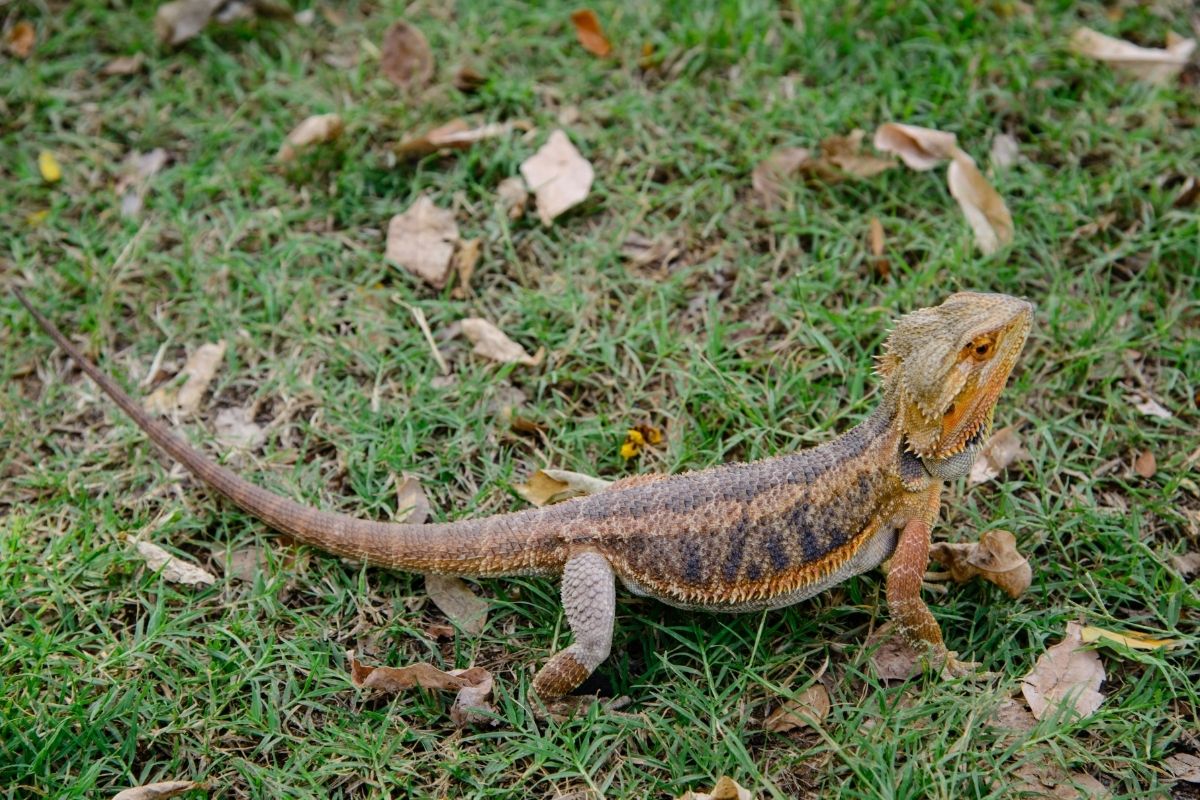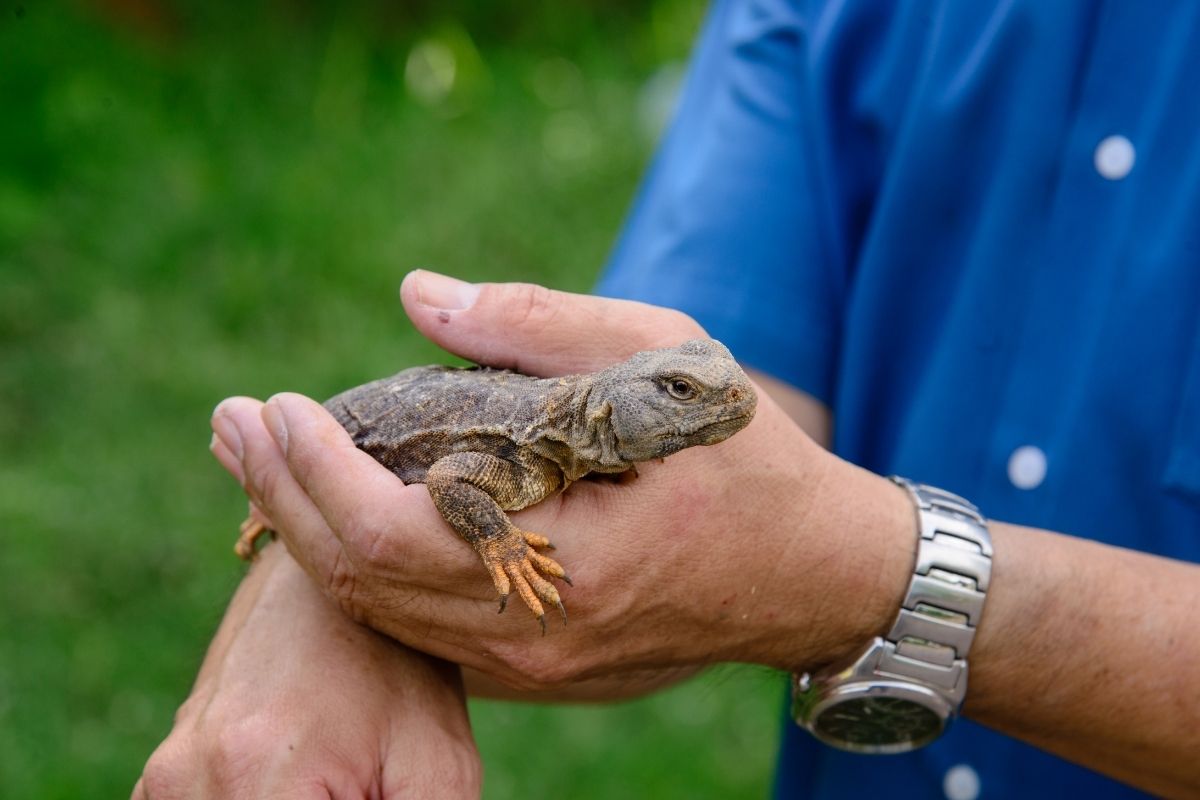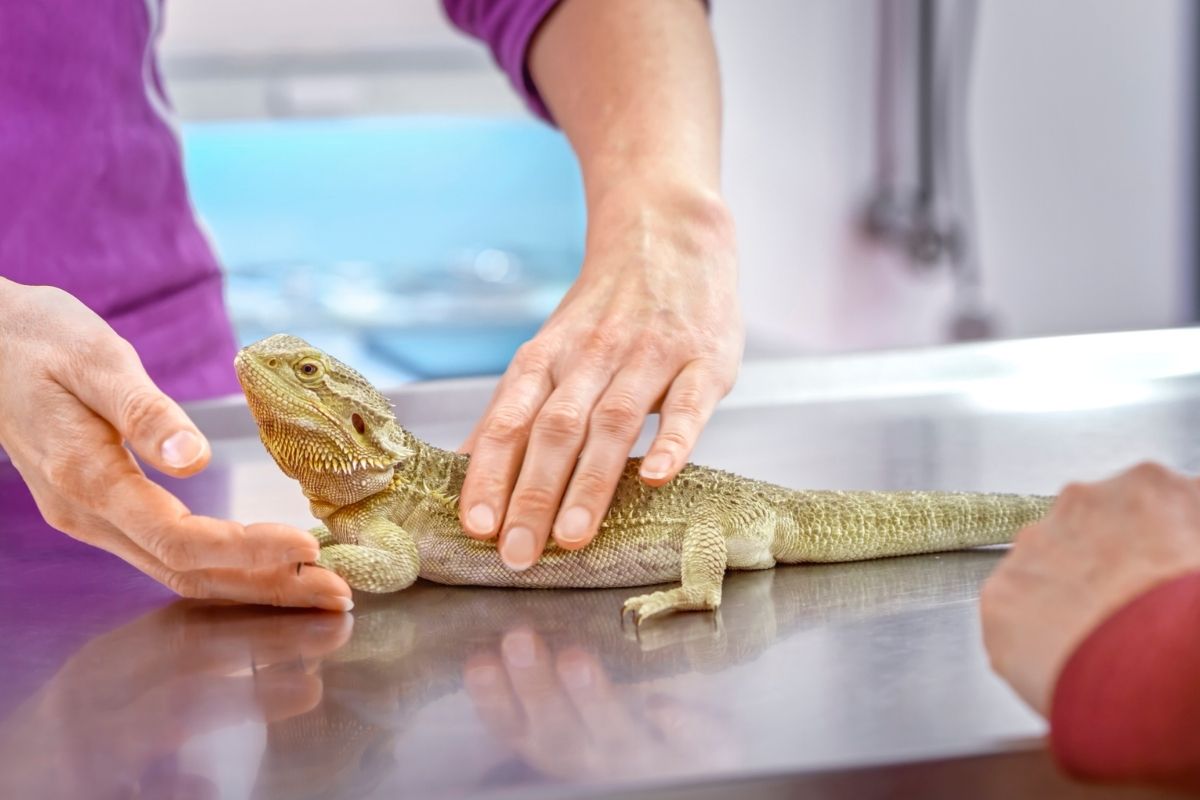Bearded dragons are one of the most popular exotic pets out there. They are pretty low maintenance for a pet reptile while also offering some interesting challenges for a pet owner interested in looking after a more unusual pet.
One thing that makes bearded dragons more difficult to look after than many other animals is the conditions you need to provide them with.

Bearded dragons need to be kept in a specific environment to keep them in good health, and changes to their habitat can lead to health issues, including diarrhea.
If your pet bearded dragon has started having diarrhea, don’t panic! There are several reasons why they might be having these issues, but as long as you treat their diarrhea properly, they shouldn’t come to any harm.
In this guide, we’ll take you through some causes of diarrhea in bearded dragons and what you can do to nurse them back to health. So let’s get started and see what you can do to make sure that they get better again in no time.
Why Does Your Bearded Dragon Have Diarrhea?
So what exactly causes diarrhea in bearded dragons? There are actually several reasons. The first thing to consider is whether your bearded dragon has been stressed by something.
Stress can cause diarrhea because it makes the body produce too much watery waste.
It may also affect how well your lizard eats, which could then result in diarrhea, in turn. If this is the case, then finding out what is causing your bearded dragon to be stressed or the issues with their eating can help you sort out their diarrhea.
Another cause could be an infection. An infection will usually show up on your bearded dragon’s skin. You should always check over your lizard if they have an open wound or sore, and if they do, then you should seek medical attention.
Some infections are caused by bacteria, fungi, parasites, viruses, or even worms.
You can’t always tell whether your bearded dragon has an infection from its skin, however, and several diarrhea-causing infections are completely internal.
These types of infections can be very serious, so you need to act quickly to ensure that your bearded dragon gets treatment.
The third reason that your bearded dragon might have diarrhea is that their diet isn’t quite right. A healthy diet is important for reptiles, and if you’re feeding your bearded dragon a poor diet, then it could be leading to problems like diarrhea.
For instance, if you feed your bearded dragon only lettuce leaves all day long, then it won’t be getting enough nutrition from its food.
As a result, it will start producing extra liquid waste, which can lead to diarrhea. The same goes for diets containing high levels of sugar.
Sugar can cause dehydration in lizards, and if your bearded dragon is eating lots of sugar-rich foods, then it will drink more water and could end up developing diarrhea.
A fourth possible cause of diarrhea in bearded dragons is that they have too much water.
This could be from their food – as mentioned before, too much watery lettuce or other foods with high water content will increase the amount of water in their waste. Alternatively, simply drinking too much water will lead to issues like diarrhea.
Some reasons why your beardie might be drinking too much include being dehydrated (either because of their food or from improper temperature control) or if they have an infection that makes them thirstier.
Things in the water itself can also have an effect; bacteria, chemicals, and other external influences can make your bearded dragon sick or increase the risk of diarrhea.
How To Find Out What’s Causing Your Bearded Dragon’s Diarrhea

So now you know some of the things that can give your bearded dragon diarrhea, you need to find out what’s actually causing the issue. Luckily, there are many ways to figure this out.
First off, you’ll want to get your bearded dragon checked out by a veterinarian or reptile specialist. They can look at your beardie’s health history and examine them physically to see if any signs of illness are present.
Their physical examination will also allow them to take samples of your bearded dragon’s blood and urine, which they can use to test for certain diseases and conditions.
If your bearded dragon does have an underlying problem, then your vet may recommend treating your bearded dragon with antibiotics.
Antibiotics aren’t something that everyone likes using, but they are necessary when dealing with bacterial infections. It’s best to talk to your vet about the best way to treat your bearded dragon with antibiotics, though.
Sometimes, your vet will prescribe different medications depending on how severe the condition is. In addition to antibiotics, your vet may also suggest fluids, probiotics, and other treatments to help your bearded dragon recover.
If the diarrhea is caused by stress, then you need to figure out what is stressing them out.
Beardies can have a hard time adjusting to change; if you’ve just brought them home, changed or rearranged their tank, or introduced something new to their environment, it could be the cause behind your bearded dragon’s stress.
Other stress-inducing factors include excess light and noise.
If the tank is too bright or if the light is left on all the time, then it can make your beardie uncomfortable, while loud noises will scare them and cause them distress.
Temperature can also come into play, as well as the size of their tank – an adult bearded dragon should be kept in at least a 55-gallon tank at a temperature of 75-85℉ (24-29℃) during the day, 70-75℉ (21-24℃) at night, and with a basking spot of 88-100℉ (31-38℃).
For diarrhea caused by their diet, try to figure out what your bearded dragon could have eaten or drank to cause it. If you’ve recently changed what you feed it, then this might be your culprit.
Your vet will also be able to help you and can prescribe special bearded dragon food or give you advice on what your bearded dragon should be eating.
A bearded dragon needs to follow a specific diet in order to stay healthy, and eating something that it shouldn’t can cause health issues like diarrhea.
Similarly, your bearded dragon should be drinking clean, filtered, or bottled water; tap water can contain harmful contaminants that will make your bearded dragon sick, and a dirty water bowl fosters bacteria.
Giving your beardie the right foods and clean water can help get rid of their diarrhea.
If your bearded dragon is showing persistent symptoms, it could be a sign of something more serious. Check again with your vet to see if there are more issues at play and to get treatment for your bearded dragon’s diarrhea.
How To Treat Diarrhea In Bearded Dragons?

Diarrhea in bearded dragons can be treated with a variety of methods. The most common method used is to administer medication orally. Medications such as antibiotics and anti-diarrheal drugs can be given through a syringe or spoon.
However, you’ll want to do some research before administering any medication to your bearded dragon. You don’t want to accidentally overdose them or give them something that isn’t safe for them.
Make sure that you’re familiar with the dosage guidelines for each type of medication you use, and consult a vet and/or bearded dragon specialist beforehand.
For more serious cases, your bearded dragon might need to be put on fluids.
This is something that the vet will do as it can be a delicate procedure, and it will help to flush out the harmful bacteria or virus that is causing their diarrhea while also replenishing their body’s fluid levels.
While you won’t need to handle the procedure yourself, your vet will ask you to monitor your beardie’s health afterward and keep a close eye on how much it’s eating and drinking.
They may also prescribe a specific diet to make sure your bearded dragon makes a full recovery.
You can find out if your bearded dragon has parasites by bringing a stool sample to a vet for them to examine. If they find parasites, then they can treat them.
Parasites are very dangerous to bearded dragons because they can easily spread if you have multiple in one enclosure and can go unnoticed for a long time.
It’s important to remove these parasites from your bearded dragon as soon as possible so that they don’t infect other animals or cause further issues.
Parasite treatments and dewormers can rid your bearded dragon of whatever is causing their diarrhea.
Stress- or diet-related diarrhea is the easiest to treat as long as you can find the cause.
Typically, just removing the distressing stimuli is enough to get your beardie back on track, but they might still need some treatment before they start feeling better.
A soak in some warm water can help to calm down your bearded dragon and bring them back to normal. Fill a shallow basin with some warm, clean water, and let your beardie rest.
Keep a close eye on them while they’re in the water, and don’t let them stay in there for more than 15 minutes. Gently pat them dry with a towel after – if they get too cold because they are wet, this could actually make their diarrhea worse instead of better.
Frequently Asked Questions
What Foods Should I Give My Bearded Dragon?
Bearded dragons need to stick to a certain diet in order to stay fit and healthy. Their diet should mainly consist of small live insects, and leafy greens, occasionally supplemented with small portions of fruit.
Aim for a ratio of around 25% insects and 75% made up of leafy greens, vegetables, and the occasional bit of fruit. A bearded dragon’s favorite foods include mealworms, crickets, sweet pepper, kale, parsley, and watermelon.
What Should A Bearded Dragon’s Stools Look Like?
Normally, bearded dragons’ stools look like little pellets. They are typically quite dark and fairly soft. This can change depending on what your beardie has been eating (for example, fruit can make them softer while some insects can make them harder).
The white parts of bearded dragon droppings are known as urate, and it’s what beardies produce instead of urine.
You might find that the droppings are in a pool of liquid; this is normal and is just excess water; however, the droppings themselves should never be runny. If your beardie is pooping more often and is producing runny stools, then it could be a sign of diarrhea.
What Are The Health Risks Of Diarrhea In Bearded Dragons?
If you catch it early and give your beardie the right treatment, then they should face no long-term health effects from diarrhea. However, if left untreated for too long, then your beardie can become dehydrated, malnourished, or even die.
Because diarrhea quickly removes water and food from your bearded dragon’s body, unchecked diarrhea can leave it without the adequate nutrition it needs for survival.
Diarrhea can also be indicative of a larger problem. This is only in the worst-case scenario, however, and getting your bearded dragon’s diarrhea treated quickly will make sure that it makes a full recovery.
If you have any further concerns, consult your vet right away.
Final Thoughts
It can be worrying when your pets get sick, and if your bearded dragon has diarrhea, then it’s only natural to feel concerned. Luckily, as long as you take the proper steps to ensure your beardie’s recovery then you have nothing to worry about.
If your beardie is suffering from diarrhea, use the information in this guide and consult your vet, and your bearded dragon will be back to full health in no time.
Just like any other pet, your beardie needs a good diet, the right habitat, and plenty of care to make sure it stays happy and healthy.
While there’s always the chance that they will still get sick from time to time, as long as you provide your bearded dragon with everything it needs, then you’ll be able to give it the best life possible.
